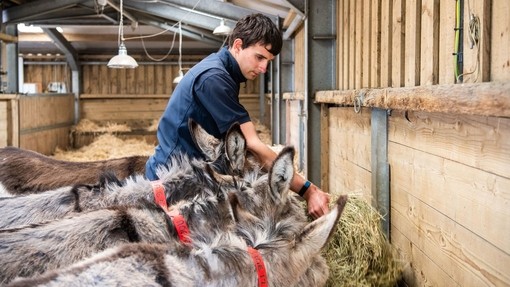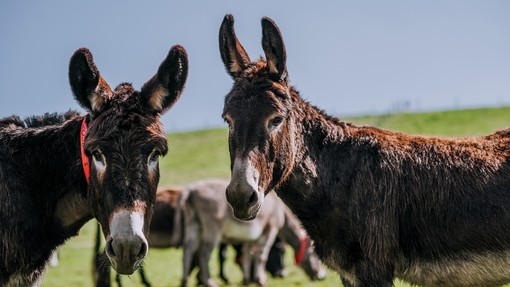Feeding and weight management
Consider your donkey’s health and stage of life before turning out to graze as most donkeys will become obese on unrestricted grazing. Follow our tips and advice on effective weight management in donkeys and more about what you should feed a donkey and things to avoid.
Limit your donkey’s grass intake using track systems and enrichment planting. The rotation of grazed areas can also be very useful in helping to control parasitic worms in donkeys. Read our advice about keeping donkeys on small pastures and how to manage a healthy donkey environment.
Be aware of the risks of laminitis in donkeys as they are particularly at risk of this condition during the spring when the grass is rich. Learn more about laminitis in donkeys: it’s causes, symptoms and how to treat it effectively.
Grooming
Looking after your donkey’s coat is the secret to keeping it shiny and healthy. As donkeys begin to shed their winter coat you can help by grooming them thoroughly using an appropriate comb or brush, taking care over sensitive areas. Read more about grooming a donkey’s coat.
Hazardous plants and trees
Oak trees should be fenced so that donkeys cannot reach branches or falling acorns. Oak poisoning is usually seasonal and most common in spring when the young buds or leaves are eaten. Read The Donkey Sanctuary’s guide to keeping donkeys safe from common poisonous plants and trees.
Ragwort is a toxic plant that has become a widespread issue for donkey and horse owners, as the plant, which commonly thrives on wasteland and road verges, continues to spread to grazing land. Find out how to keep donkeys safe from Ragwort.
Insects and parasites
Begin a fly protection programme and if necessary, begin applying fly repellent as it can sometimes take donkeys a while to get used to this. If your donkey objects to a spray, try applying the repellent with a grooming brush. Consider removing your muck heap to minimise flies during spring and summer. Read our advice on protecting donkeys from insects.
Be vigilant for ticks in spring and summer. A common area where they attach is in between the donkeys back legs, under the tail and in the ears. More information about ticks can be found in our free download Donkey Care Handbook. This guide also includes information on keeping your donkey healthy and avoiding illness and is an essential reference for both novice and experienced donkey care givers.




